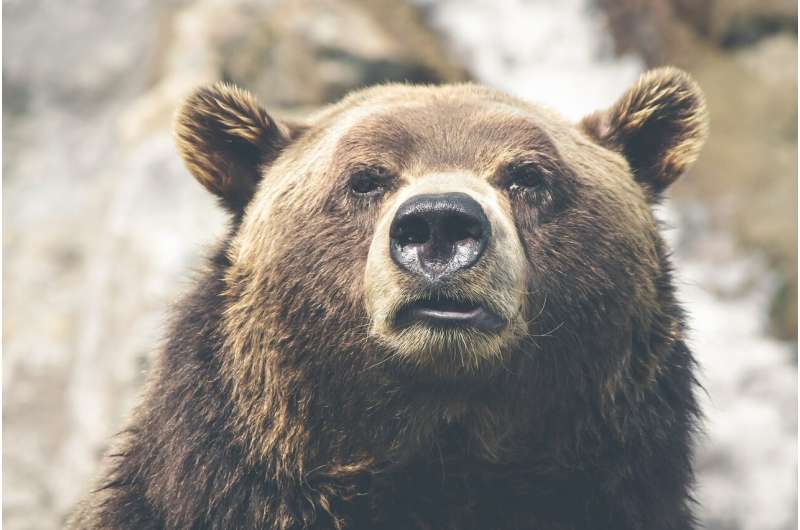Credit: CC0 Public Domain
How would you feel if a large carnivore roamed in your backyard?
Now what if this animal was a threatened species, and efforts to protect it were underway? This is the situation in Alberta, Canada, where conservation projects are helping the threatened grizzly bear population to recover, but not without local controversy. But is this controversy simply because people fear these bears, or is there more to it?
A new study in Frontiers in Ecology and Evolution has investigated the perspectives and experiences that local people have about grizzly bear conservation policies. The findings suggest that accounting for local perspectives when designing conservation policies may be the key to increasing community support in conservation projects, and thereby improving their success.
Grizzly bears were once considered at risk of extinction in Alberta. In 2010, they were declared a threatened species with only an estimated 700 bears across the entire province. The major culprits underlying the fall in bear numbers include habitat loss and death because of conflict, illegal hunting and vehicle collisions.
In response, government authorities in Alberta introduced a hunting ban, educational outreach, actions to reduce conflict between people and bears, and managed human access to bear habitat. Although these policies have been in place for some time, they are still controversial among local people and officials, and frequently provoke anger and frustration.
Seen by some people as a symbol of the Canadian wilderness, grizzly bears also incite fear as they can sometimes pose a risk to personal safety. Dr. Courtney Hughes of the Government of Alberta wanted to investigate if people's frustrations with bear conservation policies were rooted in how the policies were designed and implemented, rather than simply their attitudes towards bears.
"I wanted to dig into what makes grizzly bear recovery so challenging," said Hughes. "While we already know a lot about how to protect bears from a biological and ecological perspective, we still don't understand enough about why species recovery is so controversial at a local level."
To investigate this, Hughes and her colleagues conducted a study of Alberta's grizzly bear recovery strategy from 2012-2014, and interviewed people who live and work in bear-populated areas to gauge their perspective on conservation policies. The people who participated included ranchers and farmers, wildlife enforcement officers, biologists, petroleum and forestry workers, and people working for environmental NGOs.
Interestingly, there was significant overlap in the frustrations of all the interviewees with the conservation policies. These included technical issues such as a lack of clarity in the policies, inconsistencies in how they are applied, and a lack of funding and staff numbers. People also felt that their opinions weren't adequately considered when the conservation policies were designed and implemented, and they weren't involved enough in the decision-making process.
"People felt disconnected from the conservation policies and frustrated by them, and yet these are the very people who we, as conservationists, expect to implement them," said Hughes. "In future, local people need to be an active part of decision-making processes, and not just paid lip service in engagement processes, or 'check the box' consultation. People want to share their voice and be heard, whether that's government staff, researchers, ranchers, farmers or industry personnel, and more often than not, everyone."
The researchers hope that sharing the decision-making burden among local people could help them to feel more invested in the policies, meaning that they would be more likely to comply with the rules they helped design. This approach could also help to reduce conflict when the conservation policies are implemented, ensuring that they work well for everyone, bears and humans alike.
Importantly, the lessons learned here about engaging local people in decision making may help conservation efforts globally as countries struggle to stop the declining populations of large animals worldwide.
More information: Courtney Hughes et al, Problem Perspectives and Grizzly Bears: A Case Study of Alberta's Grizzly Bear Recovery Policy, Frontiers in Ecology and Evolution (2020). DOI: 10.3389/fevo.2020.00038
Provided by Frontiers






















